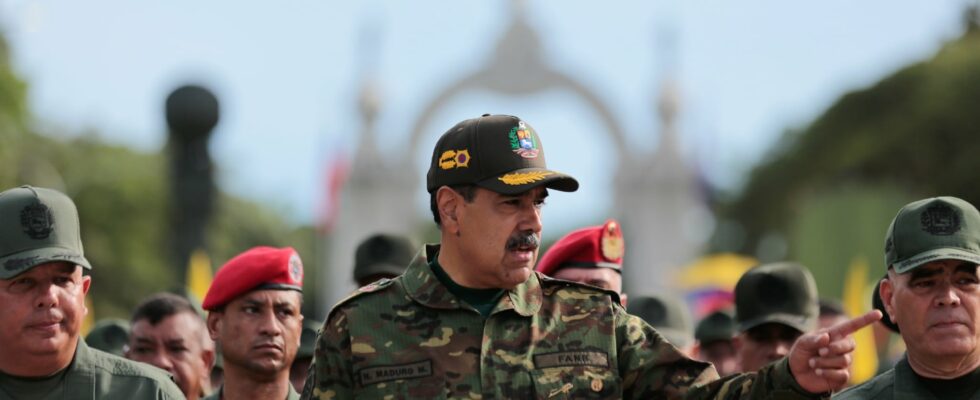In the El Miedo hacienda, the fences move at night: this is how Romulo Gallegos described the relentless practice used by his character Dona Barbara to seize land that did not belong to her. The emblematic Venezuelan writer of the 20th century and the first democratically elected president of this country [NDLR : entre le 17 février 1948 et le 24 novembre 1948]overthrown by a coup a few months later, constructed in his novel a metaphor for the Venezuela of the dictator Juan Vicente Gomez (1857-1935), who governed this nation for thirty-five years as if it were a farm. At gunpoint, prey to despotism and violence. It was the portrait of an era.
Nearly a century later, Venezuela has been governed for twenty-six years by a regime that began in 1998 with the election of Lieutenant Colonel Hugo Chavez Frias, who led two coup attempts, was acquitted and then nominated as a candidate, subsequently winning several presidential elections, supported by popular support. Chavez remained in power for four consecutive terms. He launched a constitutional process that paved the way for the sequestration of institutions, dissolved the separation of powers and fostered a system of fierce political repression that stifled the media and independent voices. Eaten away by a fulminating cancer that weakened his health and to which he would eventually succumb, he designated as his successor Nicolas Maduro, the least well-placed of his disciples.
In ten years, more than 10,000 people have been murdered
One hundred years after Romulo Gallegos’ Dona Barbara, nine million Venezuelans have emigrated for economic and political reasons, at least a thousand of whom have died devoured in the Darien jungle. [NDLR : entre la Colombie et le Panama] and more than a million are waiting for a decision on their asylum applications. One hundred years after Romulo Gallegos described the darkness in which Dona Barbara operated, 92% of complaints about human rights violations have remained unanswered, more than 300 political prisoners are incarcerated in military prisons and nearly 20,000 citizens have been victims of arbitrary arrests. In just ten years of Nicolas Maduro’s government, more than 10,000 people have been murdered, nearly 2,000 tortured and 8,000 assaulted. The figures come from Provea, a Venezuelan human rights NGO founded in 1989.
In the El Miedo hacienda, the fences move at night, wrote Romulo Gallegos. Squandering, abuse, looting. Hugo Chavez came to power at a time when the price of a barrel of oil was at its highest value. He implemented measures that had a positive impact on reducing the poverty rate and that served as a mechanism for mobilization and political loyalty. The ruling party and the State ended up merging into the same clientelist structure. In just three years of Nicolas Maduro’s government, more than 14 million people lived in poverty. When Hugo Chavez came to power, that figure was 11 million. The country was falling apart.
A dialectic that eroticizes the European radical left
A strange political court began to cover an openly totalitarian regime, imposing severe restrictions on economic and civil liberties, and in which nearly 500 independent media outlets were harassed before being closed. This revolutionary and liberating moral dialectic that eroticized the European radical left began to mislead the social democrats. The epic of the revolutionary, initiated by Martí and taken up by Fidel Castro, and dismantled by authors such as Octavio Paz, Mario Vargas Llosa or Carlos Rangel, created an illusion in the romantic intelligentsia. It made people believe that utopia was possible and that Latin America was the brake on imperialism and capitalism. This may have been inspiring, even festive, for them, but for Latin America it was and remains regrettable. Just like the Marxist intelligentsia of the 1960s, which distrusted democracy, which it considered a facade of the bourgeoisie, it ended up constructing new mirages and telluric delusions whose only and obvious counterpart can only be economic.
The long Venezuelan night that allowed the most serious humiliations of the last twenty-five years to be committed continues. An opposition coalition now united and with renewed leadership, but fiercely persecuted and stigmatized, must face the enormous challenge of defending an electoral victory that was evident after the day of July 28. Venezuelans have seen how the unofficial liberalization of the dollar in recent years has shattered a gigantic system of state aid that had served as a means of pressure, since the time of Hugo Chavez, in exchange for votes and political loyalty.
The old stratagem of barbarism
Unable to mobilize its bases, especially in the poorest regions, the regime of Nicolas Maduro has crossed all the most obvious red lines towards radicalization and satrapy. More than 2,000 people detained and kidnapped are evidence of a new repressive attack. The Venezuelan opposition, represented by Maria Corina Machado, declared ineligible as a candidate by Maduro and finally represented by Edmundo Gonzalez Urrutia, provided the minutes of the polling stations throughout the country. The opposition obtained 6,275,182 votes, while Maduro collected 2,759,256 votes. The popular will, however, is lost in the old stratagem of barbarism, the same one that makes the fences in the El Miedo hacienda move at night.
By *Karina Sainz Borgo, Venezuelan journalist and novelist
Translated by Christel Navarret
.
